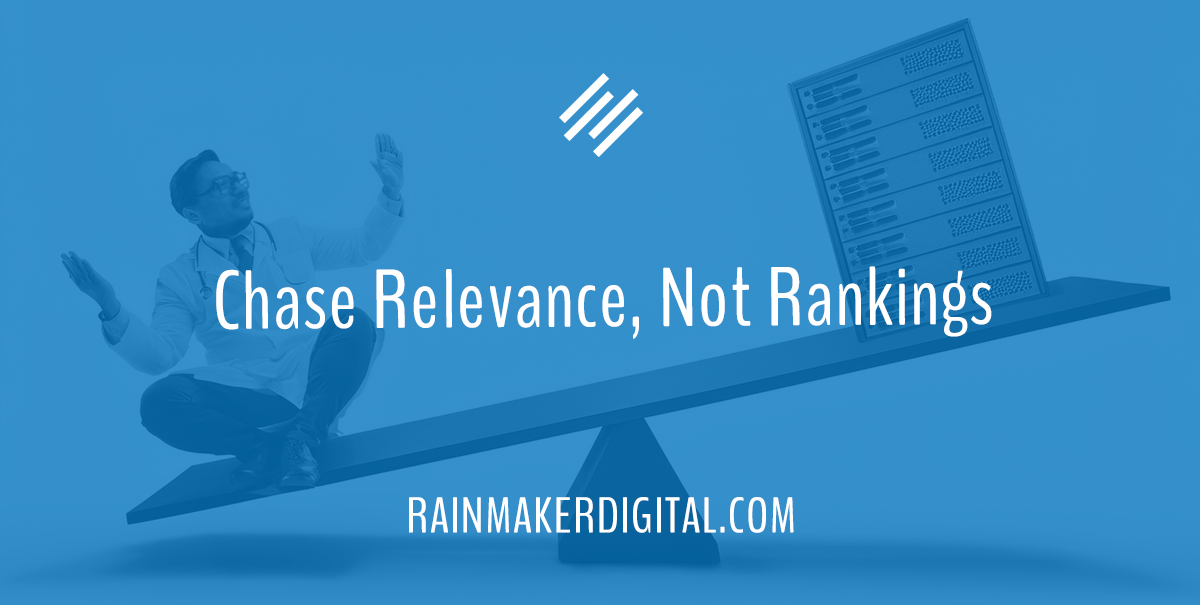Everyone wants to be first. But is it worth it?
Several years ago, a good friend of mine worked for a company where the CEO was obsessed with reaching the first position on Google search. He had a list of 250 or so search terms, and every week my buddy would get called into a meeting where the CEO would read through the SEO reports and blast the staff if there weren’t enough number one rankings. “What are we doing to get to the top on these?” was the constant question.
There may have been a time when this attitude made sense.
It doesn’t anymore.
“Being first on Google” is a bad strategy. Stop chasing rankings and start chasing relevance.
Why is “First” Bad?
The value of Google’s “first position” has been diluted.
Adwords, Maps, Shopping, Local Services … there’s something at the top of almost every Google search engine results page (SERP). And it’s not your blue link. It might be you …but seldom is it your organic listing.
It’s even worse if you’re searching for non-branded keywords. Branded keywords are 18 times more effective; if you have a name that’s even somewhat unique, you have a good chance at making that top link for related keywords. But if you’re trying to rank for something like “best marketing agency,” the competition is much stiffer.
20 years ago there were ~60 million websites. Today there are ~2 billion. Put that another way, in the heyday of SEO, the Internet was three percent of the size it is today. And most people weren’t using best practices. First was easier.
Additionally, those short keywords aren’t even what most people are searching for anymore. More complex keywords means there are a lot more ways to rank, and a lot more specificity in search queries. Chasing short keywords is optimizing for a shrinking percentage of the search market. There’s less simple search, more long-tail & keyphrase. Voice search is part of this; 20% of all search users are now using voice. And over 90% of search queries are long-tail.
Chase Relevance
The answer is to chase relevance.
Create content that’s relevant for your audience and answers their questions.
People are looking for real answers. Look at the uptick in Reddit searches and the resurgence of group chats, forums and platforms like Discord. You need to show yourself relevant to the community you serve.
Put your brand in conversations around topics your audience cares about. With LLMs (the large language models that drive AI search), this is critically important — since they pull from context, you need to boost the chances of your brand appearing in the right context. PR is great for this. Involve yourself in organizations, put out press releases, give quotes and get your name in the conversation.
Adjust language on your site and any publicly-crawled sources — make sure that if there are specific terms you want to be known for, that they’re everywhere on your site AND shown in conjunction with your brand.
And consider posting on other sites that get crawled, not just your site. Reddit, Quora, Medium, LinkedIn … if it’s popular and publicly crawled, take a look. Your goal is to show up in the conversation in as many places as possible.
Audience Always Comes First
Instead of approaching search from the angle of “what does Google want to rank my site first,” approach from the angle of “what does my audience want to know?”
Only then can you optimize effectively.
The quest for “first” is a thing of the past. The question now is “am I relevant to the conversations my audience is engaging in?” Everything revolves around that.
Chase relevance. Not rankings.
And if you need a hand, don’t hesitate to reach out. Just drop us a line, anytime.
Best Regards,
David Brandon
Copywriter
Rainmaker Digital Services
